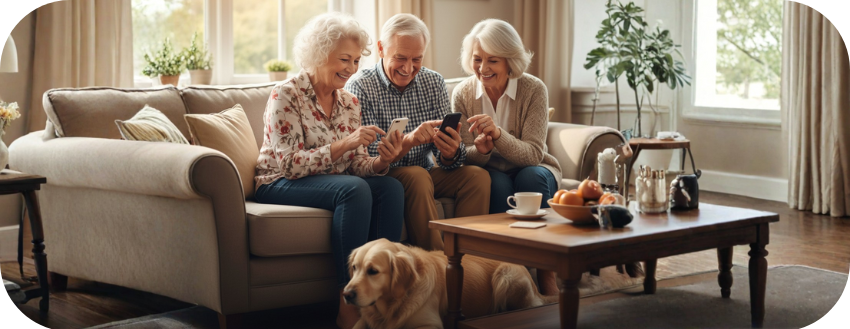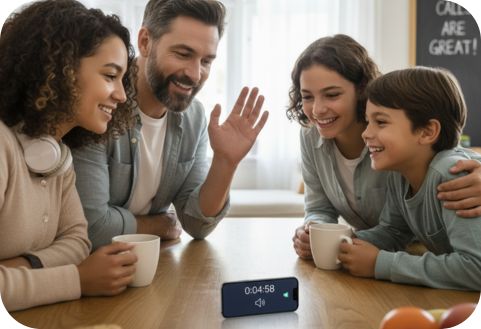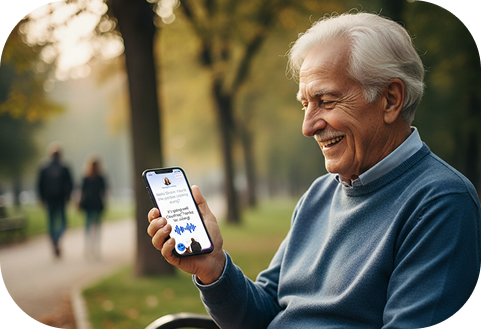Alzheimer’s Care for Seniors: How ReComune Makes a Difference?
Alzheimer’s disease is one of the most prevalent and challenging neurological conditions affecting seniors today.
Updated on: 26 Jan 2026

In today’s hyperconnected world, many older adults still experience an invisible silence loneliness. Despite the abundance of digital tools, emotional isolation continues to rise, especially among seniors. Yet research shows that something as simple as a five-minute phone call can transform emotional health, rebuild connection, and even prevent depression. This blog explores why short, consistent calls make a big emotional impact, how to make them meaningful, and what science says about their powerful role in reducing loneliness.Emotional Well-Being and Reduce Loneliness
Loneliness is not just a passing emotion it’s a public health issue. According to the National Institute for Health Research (NIHR), persistent loneliness is linked to a higher risk of depression, dementia, and early mortality among older adults (NIHR, 2024). The regular five-minute telephone calls with empathetic care providers reduced emotional loneliness by 21% within three months. The human voice familiar, warm, and direct acts as a powerful emotional anchor, especially for those who feel forgotten.
A simple, consistent phone call reaffirms what every person needs to know “You are seen. You are heard. You still matter.”

While video calls and text messages are helpful, studies show that voice-based communication uniquely strengthens emotional regulation. Researchers from the Dell Medical School at the University of Texas found that empathy-focused phone calls decreased depression and anxiety by up to 37% among isolated adults (Dell Medical School, 2021).
Why does this work?
Even a brief, scheduled check-in reminds seniors that someone remembers and values them—a critical factor in emotional well-being.
It’s not the duration it’s the consistency that matters.
A five-minute conversation is short enough to fit into busy lives but powerful enough to boost connection. A study published in Forbes (2024) found that weekly phone calls over eight weeks improved mental well-being and encouraged ongoing social interaction among isolated seniors (Forbes, 2024). Researchers noted that small, repeated efforts built long-term habits of communication. These conversations also helped participants plan social activities and regain confidence in reaching out to others.
Five minutes a week can reawaken a lifetime of connection.
Human connection through the spoken word triggers emotional and biochemical responses.
Hearing a loved one’s voice releases oxytocin the “bonding hormone which reduces stress and fosters a sense of belonging. A ScienceDirect (2023) study on “friendly phone visits” showed that older adults receiving consistent voice calls reported lower stress levels and improved mood regulation (ScienceDirect, 2023).
It’s not high-tech magic; it’s human presence—transmitted through sound, empathy, and attention.

Consistency builds trust. Set a fixed time each week for your call and treat it as sacred. Studies show that predictability helps seniors feel secure and valued (NIHR, 2024).
Ask simple, heartfelt questions like:
Listening without rushing gives emotional depth to even short conversations.
Your tone can heal. Empathetic pauses, laughter, or a gentle word build emotional intimacy—especially important for seniors who live alone.
Close the call by confirming the next one:
“I’ll call you again on Friday morning. I’m looking forward to it.”
This builds structure and anticipation small anchors that hold big emotional weight.
It’s not one call it’s a rhythm. Encourage mutual reflection: “Did this call make you feel better?” Simple acknowledgment reinforces the emotional value of staying connected.

Empathy-centered calls decreased depression and anxiety rates among isolated adults by up to 37% (Dell Medical School, 2021).
Seniors participating in phone-call programs showed enhanced cognitive engagement and reduced feelings of helplessness (NIHR, 2024).
Regular communication fosters reciprocity. Participants in outreach programs reported feeling more useful and socially capable (Rally Mass General Brigham, 2023).
Friendly calls serve as emotional “reset buttons,” offering comfort during stressful or lonely days.
While five-minute calls are powerful, it’s important to recognize common barriers and find supportive solutions.
Some seniors hesitate to use technology due to fear or mistrust. Patiently introducing simple phones or tablets with clear instructions can ease this fear. Emotional reassurance during learning improves digital confidence.
Not all older adults can afford internet plans or modern devices. Programs like Senior Planet and AARP’s Digital Inclusion Grants help bridge this gap. Accessibility is not luxury it’s connection.
Digital interaction can feel less personal. Combining calls with occasional in-person visits strengthens trust and deepens relationships (SpringerLink, 2024).
Loneliness is multifaceted; one call won’t erase it overnight. What matters is regular, empathetic contact building a lasting emotional habit that nurtures well-being.

Families are the heart of connection and their role in combating senior loneliness is invaluable. Simple gestures, like consistent short phone calls, can reignite emotional bonds and enhance well-being for older loved ones. Start by creating a shared family call schedule, allowing children, grandchildren, or siblings to take turns calling. This rotation ensures that seniors hear multiple voices throughout the week, offering variety and comfort. Studies by the National Institute for Health Research (NIHR, 2024) show that regular phone contact, even for just a few minutes, significantly reduces emotional loneliness and improves mental health in older adults (NIHR, 2024).
Using speakerphones or group calls allows seniors to participate with less physical effort and creates a lively, shared experience. Encourage grandchildren to make spontaneous check-ins their youthful energy and laughter offer therapeutic joy and cognitive stimulation (ResearchGate). Even a five minute chat hearing a familiar voice, sharing a small story can brighten the day and remind seniors they’re still deeply connected to family life. These short, frequent calls nurture intergenerational bonds, lift mood, and transform ordinary moments into lifelong emotional memories.

The future of emotional connection is not only human it’s digital, empathetic, and accessible. As loneliness among seniors continues to grow, AI companions and chatbots are stepping in to provide company, conversation, and emotional reassurance when loved ones are far away.
Modern AI companions such as ReComune, Character.AI, Replika, and Hyodol are designed with seniors’ emotional well-being in mind. Recomune, a newly emerging AI platform, focuses specifically on “empathetic conversations” voice or text interactions that replicate human warmth while maintaining privacy and respect. In this digital age, connection no longer depends on distance just on intention, empathy, and the right balance between human and artificial compassion.
In a world that often moves too fast, connection can feel out of reach but it doesn’t have to be. A simple five-minute phone call holds the power to restore warmth, belonging, and hope to someone who feels unseen. For older adults, especially those living alone, hearing a familiar voice can reduce anxiety, lower stress, and spark joy that lingers long after the call ends.
Science confirms what the heart already knows: empathy heals. Whether it’s a weekly check-in, a quick chat, or a surprise hello, those few minutes can rebuild emotional bridges that distance or time may have worn down. Every call reminds us that care doesn’t need to be grand it just needs to be genuine. So, pick up the phone today. Your voice could be the light that turns someone’s loneliness into laughter, connection, and renewed emotional well-being.e’s heart.